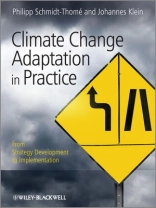Climate change adaptation is increasingly recognized as
complementary part to climate change mitigation. Climate
change affects sea level, the extent of flood prone areas and
precipitation patterns among many others. To adapt to these
changes, the tasks of municipalities and cities are to implement
policies and strategies for changes in land use and coastal
management as part of their future development. It is of
vital importance to address the uncertainties of climate change
scenarios when proposing adaptation measures that are socially
viable and economically reasonable. The decision making
process, promoted here, is based on scientific excellence as well
on an integrated communication process.
This book provides a comprehensive overview of key elements
required for effective analysis and assessment of climate change
impacts, economic cost-benefit analysis, communication processes
and creation and transfer of knowledge, governance issues and
implementation of related policies. It describes the results
achieved by the Balt CICA (href=’http://www.baltcica.org/’>www.baltcica.org) project whose
contributors come from the scientific and public administration
communities. The regional cooperation has led to the implementation
of climate change adaptation in several case studies. The Balt CICA
project developed concepts, methodologies and tools for climate
change adaptation that can be translated across other global
regions.
Scientists and students working on the development of climate
change and adaptation strategies; public administrators in
the related fields on local, regional and state level including
environment, water management, civil defense; as well as
professionals working with adaptation technologies, including
engineering, technological solutions, urban planning agencies and
construction, will value this innovative book.
Yazar hakkında
Philipp Schmidt-Thomé, Geological Survey of
Finland
Johannes Klein, Aalto University, Finland












